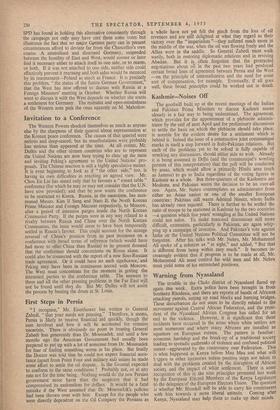Invitation to a Conference
The Western Powers shocked themselves as much as anyone else by the sharpness of their quarrel about representation at the Korean peace conference. The causes of that quarrel were serious and deep-seated; but its manifestations were probably less serious than appeared at the time. At all events, Mr. Dulles and the other sixteen countries who are to represent the United Nations are now busy trying to clear up the mess and inviting Peking's agreement to the United Nations' pro- posals. The Chinese reaction is still a highly speculative matter. It is even beginning- to look as if " the other side," too, is having its own difficulties in reaching an agreed view. Mr. Chou En Lai has stated only that he favours a " round table " conference (for which he may or may not consider that the U.N. have now provided), and that he now wants the conference to be restricted to Korea. Russia, in the meantjme, has sum- moned Messrs. Kim II Sung and Nam II, the North Korean Prime Minister and foreign Minister respectively, to Moscow, after a period of intensive purges inside the North Korean Communist Party. If the purges were in any way related to a rivalry between Russia and China over the North Korean Communists, the issue would seem to have been temporarily settled in Russia's favour. This could account for the strange reversal of China's position from its past insistence on a conference with broad terms of reference (which would have had more to offer China than Russia) to its present demand that the conference should concentrate on Korea alone. It could also beconnected with the report of a new Sino-Russian trade agreement. Or it could have no such signficance; and Peking may have been in continuous accord with Moscow. The West must concentrate for the moment in getting the interested parties to the conference table. The answers to these and all the other pressing problems in the Far East will not be found until they do. But Mr. Dulles will not assist the process by beating the drum at St. Louis.


































 Previous page
Previous page